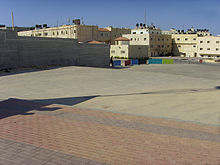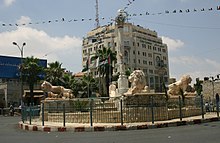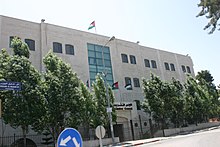Ramallah
![]()
The articles Faisal Al-Husseini International Stadium and Ramallah overlap thematically. Information that you are looking for here can also be found in the other article.
You are welcome to participate in the relevant redundancy discussion or to help directly to merge the articles or to better distinguish them from one another (→ instructions).
![]()
This article is about the Palestinian city of Ramallah, for the music band of the same name see Ramallah (band).
Ramallah (Arabic رام الله, DMG Rām Allāh) is a city in the Palestinian Authority in the West Bank. The city is home to parts of the government - in addition to Gaza City - the Palestinian Legislative Council building, parts of the executive branch, and offices of the Palestinian West Bank Security Forces.

The Muqataa, the official residence of the Palestinian President

Manarah Square after the reconstruction 2008

The new parliament building
Name
The name Ramallah is composed of the two words Ram (or Rama) and Allah. Ram in Arabic means a high place, Allah is the Arabic word for God. A free translation would give God's hill.
History
In the 12th century a fortress was built by French crusaders. Parts of the fortress at-Tireh are still preserved in the old city. In 1550 Rashed Haddad and his family founded the city of Ramallah at the fortress.
Ramallah was originally Christian and is home to several parishes. In the New Testament, Lk 2:45 EU tells of the annual pilgrimage to Jerusalem. On the way back, Mary and Joseph had noticed that the twelve-year-old Jesus was not with them, whereupon they returned to Jerusalem, where they found him in the temple. This event, according to tradition, is located in Ramallah. The Roman Catholic parish church of the Franciscans (OFM) is dedicated to the Holy Family.
In the 19th century, the Quakers came to Ramallah and founded a boys' school "Friends' Boy School" in 1869, followed by a girls' school. The historic Quaker meeting house still stands in the center - surrounded by tall commercial buildings.
In the course of the Arab-Israeli War in 1948, Jordan took control of Ramallah. Afterwards, the town was popular as a summer resort because of its high altitude. During the Six-Day War in 1967, the city was occupied by the Israeli army and taken over by the Israeli administration. In 1994, Ramallah was handed over to Palestinian self-government as part of the Oslo peace process. Although officially the capital of Palestine is stated to be Jerusalem, Ramallah is in fact the political, economic and cultural centre of the Palestinian autonomous territories.
With autonomy in 1994, the city (along with Gaza) got a parliament building and became the seat of several ministries. Subsequently, the offices of the foreign representations were opened. The German representation moved from Jericho to Ramallah (next to the city hall) a short time later.
On October 12, 2000, two Israeli reservists, Vadim Nurzhitz and Yossi Avrahami, were murdered by a Palestinian mob in a Ramallah police station. The bodies were thrown out of the window and dragged through the streets of Ramallah in a triumphal procession. The Ramallah lynching was filmed by an Italian television crew and caused international horror. The incident took place at the beginning of the Second Intifada.
After his death in a Paris hospital, Yasser Arafat was buried on November 12, 2004 in the courtyard of the Muqataa, which is actually located in Al-Bireh. After the municipal elections in December 2005, Janet Michael, a Christian, was elected mayor, the first woman to hold the post. In the summer of 2008, the city celebrated the 100th anniversary of the municipality with numerous events. As a result, downtown streets were renovated and the metal column around the Lion Fountain in Manarah Square was removed. In 2011, the roundabout of the historic Clock Square, now called Arafat Square, was transformed into a plaza. The economic boom brought international flair to the city and can also be seen in the construction of new hotels. For example, the luxury Mövenpick Hotel, whose construction had been interrupted due to the Second Intifada, opened in November 2010. In addition, there are many new commercial and office buildings, including quite a few high-rise buildings. Since 2012, there is a modern geo-information system that can be accessed on the Internet. For this purpose, all streets were previously given a name.
In recent years, architecturally remarkable buildings have been built, such as the Palestine Trade Tower, the Red Crescent building or the "Salta3 Burger", a replica of the "Krusty Krab" from SpongeBob SquarePants, which, however, was closed again after a few months and is now a café.
Search within the encyclopedia